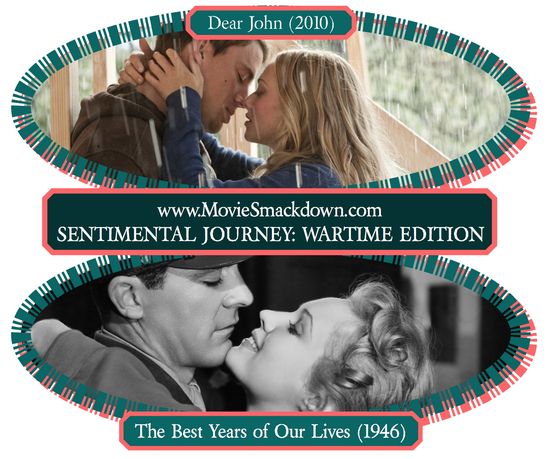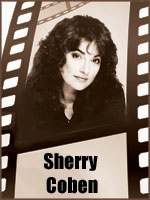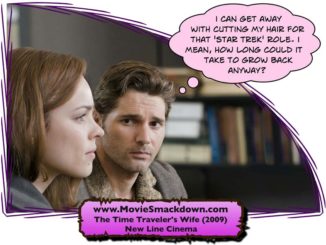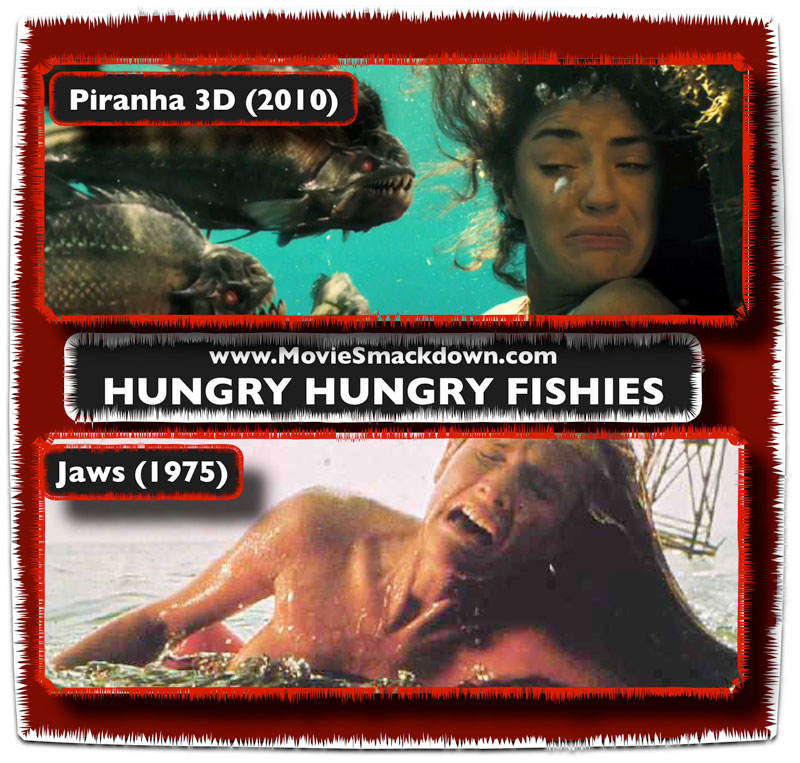
 The Smackdown
The Smackdown
“The Best Years Of Our Lives†stands tall as the ultimate and still unsurpassed drama about WWII’s returning soldiers, made in 1946 by William Wyler from a pitch-perfect script by Robert Sherwood. Director Lasse Hallström enters the love-and-war fray with his effort “Dear John†based on a novel by the very popular (if slightly gooey) Nicholas Sparks. The war in question is a lot more confusing than WWII, and the story is a whole lot soapier/dopier, but the eternal questions remain the same. What does war do to soldiers and their families and the women they love?Â
A Note:  You’re onto me. I have an agenda, and it’s none too hidden. I admit it openly. On occasion, I have used the auspices of MovieSmackdown.com to blatantly promote great films I love. A well-meaning colleague pointed out that my choosing to smack lightweight fluff “When In Rome” against the classic “Roman Holiday” amounted to constructing an outrageously stacked deck. Here’s the thing about my admittedly fixed fights; the thematic links are always obvious and unforced, and there are deprived people out there in cyberspace reading this website who’ve never heard of “Roman Holiday” or Audrey Hepburn or William Wyler. Reportedly, some misguided young film fans still balk at watching black and white movies. Perhaps my purple prose will inspire them to rent something truly exceptional next time. That said, I could have smacked “Dear John†with a more obvious doppelganger like “The Notebook†for instance. But I’m not doing that. Instead, I’m reaching back in the vaults for another William Wyler classic with parallel themes and aspirations. Consider yourself forewarned.
[singlepic id=221 w=320 h=240 float=right]
The Challenger
Hunky soldier home on leave John Tyree (Channing Tatum) meets college coed
Savannah (Amanda Seyfried). They fall in love over two weeks of mostly montage
and halting getting-to-know-you conversation and the two promise to stay true
for the next year of John’s service. Stuff happens, and his tour of duty gets
extended. Both of the slightly star-crossed young lovers fulfill what they
perceive as their personal duty, and their romantic connection is tested and
strained as a direct result of their selfless decisions.
[singlepic id=2 w=320 h=240 float=right]
The Defending Champion
Three WWII veterans return home to their small town and face all kinds
of readjustment challenges. The status they achieved in the military no longer
means much stateside; influential banker Al (Frederic March) drinks a little
too much to smooth his transition and re-entry into his now almost-grown
family, Fred (Dana Andrews) once a military big shot, finds himself struggling
to find employment, and Homer (the incomparable Harold Russell) who has lost
his hands, mistakes his fiance’s abiding love for pity. The film captures their
experience with great delicacy and elegance.
The Scorecard
Sentiment is a tricky thing in movies. Sometimes it works even when the movie’s
not very good. Everyone cries at “Old Yeller” and everyone cries at
“Marley & Me.” I don’t think the movies are in the same league
exactly, but everyone’s lost a pet or two, and the experience wells up in a big
whoosh of sensory recall. The higher the stakes, the greater the opportunity
for playing on our storehouse of emotions. War and death raise the stakes as high as they get in the movies and in our lives, and filmmakers play fast and loose
with those connections we make between our lives and their films, earned or
not.
There are moments in “Dear John†that make you cry. A few
are genuinely terrific. I’m struggling here to avoid spoilers; it’s a pet
peeve of mine when reviewers tell more of a plot than they need to do just to
pad their essays. It’s a delicate thing telling about a film without ruining it
for someone who hasn’t yet seen it, and I take that responsibility very
seriously. Let’s just say this then;
there’s a truly moving moment toward the end of the film between John and his
father (Richard Jenkins) that upends all our expectations. Director Lasse Hallström pays off the
very complicated father-son relationship absolutely brilliantly.
Falling in love with a soldier going off to war makes for a
very romantic premise. (Keeping in touch with said soldier makes for not so
compelling drama. Watching a couple letter writing and reading lacks a certain
— well – everything.) Staying in love with a soldier coming home from war
makes for compelling drama.
Young Amanda Seyfried has never looked lovelier than she
does in the early part of the film; she glows with health and promise and an
inner light. Channing Tatum is terrific in a challenging role; his soldier is
tough, mysterious, quiet, withdrawn, and carrying a big secret that’s never
fully revealed, and it won’t hurt the movie’s chances at the box office that
he’s photographed like a young god. You want the two prettiest people in the
movie to mate and have a litter and you want to take one of the puppies home.
That said, it’s a tragically underpopulated film, acting-wise. Besides the
aforementioned acting talent and Henry “E.T.†Thomas who plays the pivotal role
of a neighbor, the rest of the cast is filled out with empty suits, actors so
completely unengaging and untalented that I wondered if they simply cast the
film on location at a South Carolina PTA meeting and paid everyone in picnic
food.
The story takes some melodramatic turns and misses some easy
marks by a country mile. One of the key moments in the film occurs on and just
following September 11; Hallström gets the 9-11 day exactly right but can’t
nail that aftermath at all, saddled with scenes filled with dreadful day
players and extras. The military scenes don’t ring exactly true, but they’re
harrowing enough because we have our own details to fill in the gaps. All the
scenes involving anyone outside the four principals suffer and fall very short
of adequate.
In “The Best Years Of Our Lives,†every part is cast and
played to perfection, and as a result, all the scenes work and add up to much
more than the sum of their parts. The leads are mostly unglamorous types;
except for Myrna Loy who tones down her Hollywood starshine significantly, most
of the actors look like real people. The cinematography is absolutely stunning;
there is one particular shot at the end of the movie with all the principals
gathered for a wedding. The deep focus and design is breathtaking; we can see
every character in the film in that one frame and know exactly how each
character is feeling in that moment without a line of dialogue. The just plain
wonderful Hoagy Carmichael plays charismatic pianist and barkeep Butch, Cathy
O’Donnell inhabits the role of Wilma and touches greatness, and the always
impeccable Myrna Loy plays Milly, another version of the perfect film wife, her
stock in trade, this one her most compelling and real.
The Decision
Much as I loathe predictability in all things,
this one’s not exactly hinging on the flip of a coin. Obviously, “The Best Years Of Our Lives†reigns supreme in the
genre; not a single moment rings false, you’ll find not one gratuitous beat,
nor wasted frame in the 172 minutes running time even sixty-four years after
its release. The emotions still ring pure and true and universal, and I
challenge anyone to watch it dry-eyed and unmoved.
That said, there are worse films you could find at any
multiplex any day than “Dear John.†I found it manipulative, but you might not.
Catching the always-watchable Richard Jenkins’ touching performance might just
be worth a DVD rental, and Amanda Seyfried and Channing Tatum light up the
silver screen pretty darned well.




“…the rest of the cast is filled out with empty suits, actors so completely unengaging and untalented that I wondered if they simply cast the film on location at a South Carolina PTA meeting and paid everyone in picnic food.”
I’ve worked on some productions that feel like that! 🙂
Thanks, Rebecca. I appreciate your appreciation.
Sherry, I love your wit, perception and writing. Found you by accident since we both know Meg Wittner and I’m housebound and haplessly exploring FB. Guess it’s like the 6 degrees of separation with Kevin Bacon. Maybe something to be said for that. I am working on 2 books and an article. I think you may really like the premises. A friend of mine has started a web site dedicated to talented women (in the world.) She’s been launching it a piece at a time. I think you two might hit if off. Her name is Donna Mete and the site is Twolia.com Check it out. Me: I have only a year to impress Oprah with my book!! LOL
I remember seeing somewhere that he works for the United States Postal Service. An actual civilian. Think of that. Robert MacNaughton. I even remember his name.
“Avatar†Receives A “Dear John†Letter
According to: Studio Briefing – Film News
“Avatar is no longer No. 1 with movie fans. The James Cameron movie was unseated over the Super Bowl weekend by Dear John, a critically drubbed weepie that brought women together en masse while their husbands and boyfriends took part in the annual testosterone observance. Dear John wound up with an estimated $32.4 million — making it the highest grossing film ever to open on the weekend of the big game. Sony said that 89 percent of ticket buyers were female.”
89%. I can’t believe that statistic. That means a whopping 11% were men. All dragged in by the scruffs of their necks, no doubt.
Without Googling it, any of our readers know what happened to the eldest of the three ET siblings?
PS: great review again Sherry, I forgot to mention it before… 😉
And neither will Drew Barrymore. I think they appreciate their association with a beloved and classic film. In fact, I’m fairly certain they’re proud of their early work and know exactly how lucky they are to still be working actors. They’re both attractive adults blessed with faces that haven’t radically changed since childhood.
Henry Thomas will never get away from ET will he?
Reviving the classics is a nice touch.
Nicholas Sparks.
Honestly though, I’m simply not a fan of the whole drippy Sparks-y sentimental sub-genre. Perhaps I’m a little offended by the way Sparks uses autism, Alzheimer’s and Asperger’s to boost the stakes of his melodrama. I recognize that this sort of thing appeals to many, especially women…I just don’t happen to be one of them. That’s not to say I’m hardhearted; I’ve been known to cry at Kodak commercials and songs on the radio. I guess I’m immune to overreaching sentimentality that does my emoting for me.
I do have a soft spot for James Garner, but Richard Jenkins is pretty darned wonderful. Still, I don’t like either film enough to declare one a winner. Sorry.
I’m curious. If you had Smacked DEAR JOHN against THE NOTEBOOK which one would have won? That actually does sound like a pretty even Smackdown…